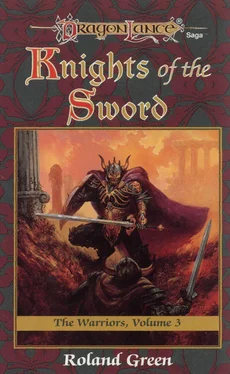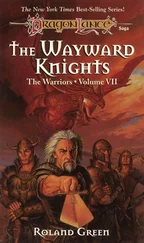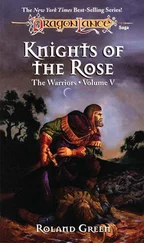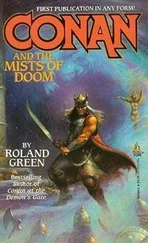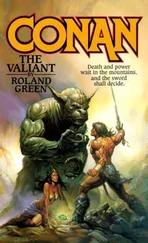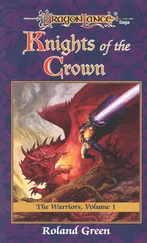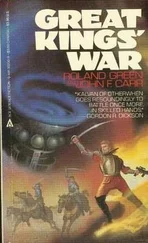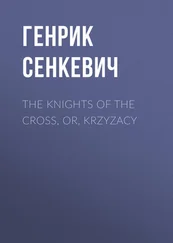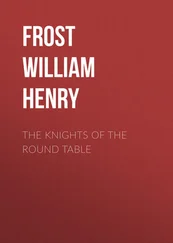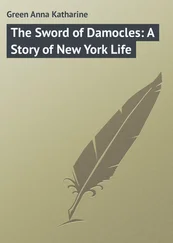Roland Green - Knights of the Sword
Здесь есть возможность читать онлайн «Roland Green - Knights of the Sword» весь текст электронной книги совершенно бесплатно (целиком полную версию без сокращений). В некоторых случаях можно слушать аудио, скачать через торрент в формате fb2 и присутствует краткое содержание. Год выпуска: 2012, ISBN: 2012, Издательство: Wizards of the Coast Publishing, Жанр: Фэнтези, на английском языке. Описание произведения, (предисловие) а так же отзывы посетителей доступны на портале библиотеки ЛибКат.
- Название:Knights of the Sword
- Автор:
- Издательство:Wizards of the Coast Publishing
- Жанр:
- Год:2012
- ISBN:978-0-7869-6337-9
- Рейтинг книги:3 / 5. Голосов: 1
-
Избранное:Добавить в избранное
- Отзывы:
-
Ваша оценка:
- 60
- 1
- 2
- 3
- 4
- 5
Knights of the Sword: краткое содержание, описание и аннотация
Предлагаем к чтению аннотацию, описание, краткое содержание или предисловие (зависит от того, что написал сам автор книги «Knights of the Sword»). Если вы не нашли необходимую информацию о книге — напишите в комментариях, мы постараемся отыскать её.
Knights of the Sword — читать онлайн бесплатно полную книгу (весь текст) целиком
Ниже представлен текст книги, разбитый по страницам. Система сохранения места последней прочитанной страницы, позволяет с удобством читать онлайн бесплатно книгу «Knights of the Sword», без необходимости каждый раз заново искать на чём Вы остановились. Поставьте закладку, и сможете в любой момент перейти на страницу, на которой закончили чтение.
Интервал:
Закладка:
Roland Green
Knights of the Sword
Prologue
Unarmored, Sir Marod of Ellersford had never been a great burden for a horse. He was a head taller than the average, but also a span narrower. One who had trained him in youth was said to have jested:
“Think you to defeat all archers, by standing sideways? Think again, young Marod!”
That was forty years ago. Now Marod was no longer young, but a Knight of the Rose in the ranks of the Knights of Solamnia. Still he remained lean.
So his mount had easy work, carrying him up to the crest of a hill not far from Dargaard Keep. He did not look at the great mass of stone and the outbuildings that sprawled about it but instead westward, toward the sunset.
Low but spike-crested hills rose there, where thousands of years of rain and wind had worn away soft outer rock from around harder cores. Some of the spikes rose against the crimson and gold blazing across part of the sky. Others were lost in spreading blue-grayness where storm clouds gathered.
A storm at this time of the spring could be great or small, doing much or little. Rather like the condition of the Knights of Solamnia-one reason that Sir Marod of Ellersford had been doing for some fifteen years the task that he hoped the True Gods would allow him to do for as long again.
That task was simple enough to put into words. It was to find for the knights resources of men, weapons, wealth, and skill not known to the priests who ruled in Istar the Mighty. It was also to keep those resources hidden from those priests-and insofar as Honor, Oath, and Measure allowed, from those knights who did not need to know of them.
The world did not fare so ill under the rule of Istar the Mighty that this was a matter of life or death. Even those lands that refused all but the most nominal allegiance to Istar did so politely (except the minotaurs, and they were no ruder to Istar than they were to anyone else, which Marod supposed was in some degree a gesture of honor). Istar ruled, peace prevailed, and men grew sleek in the arts of peace.
The Knights of Solamnia, given from youth to the arts of war, had little place in this snug world. Few came forward to fill their ranks; many left those ranks as soon as they lawfully could.
If the priests of Istar had not openly rejoiced in this, Marod might have been less uneasy. But it seemed to him that the priests rejoiced at the weakening of the knights as they would rejoice at the weakening of a would-be rival. Marod distrusted those who could not bear rivals.
An educated man, he knew well enough that even among the True Gods there were Good, Neutral, and Evil to keep the balance of the universe. Men, needing balance even more than the gods, needed to be careful about letting any among them gather too much power.
The knights would weigh in the balance against the priests merely by existing. Marod hoped earnestly that none of his and others’ fears of harsher work ahead would prove true. Yet it was already known that the priests called against justice for races other than humankind, or at least for looking the other way when injustice was done.
There was also the chief among the priests openly calling himself the kingpriest, implying that he ruled both the worship of the gods and the daily affairs of the folk of Istar. And there were rumors, to which Sir Marod did not wish to give time, let alone credence-but which chilled him to the marrow when they did intrude on his thoughts.
What intruded on his thoughts now was the sound of a horse mounting the path at a trot, then blowing as its rider reined it in. Marod turned in his saddle to see Sir Lewin of Trenfar grinning at him.
Sir Lewin was a good load for a horse even when he wore only tunic and hose, cloak, sword, and dagger. Fortunately he had the means to support mounts of a size equal to bearing him. His own house was of the lower grades of Solamnian nobility, but it was related to half a dozen of the greater houses and at least one petty king. He had not needed to stint himself since he finished his training.
The grin had become habitual only since last year, when Lewin uncovered a plot among certain petty landowners farther east to turn robber baron. He had done this both at the risk of his life and by the sweat of his brow, and thus met any reasonable requirements for elevation to Knight of the Rose, the highest rank among the Knights of Solamnia.
One of those reasonable requirements, by the Measure, was the consent of all other Knights of the Rose. This included Sir Marod, and his consent had been readily forthcoming. Not without some doubt that the honor was being thrust upon his pupil a trifle too soon, but not enough to justify withholding consent.
The gods made all of us a mixture, from the days of Vinas Solamnus to now, and because a less savory part of the mixture is uppermost one day does not mean a man has gone over to evil .
Sir Lewin unpinned his cloak and offered it to the older knight. “It is heavier than yours.”
“My years have not thinned my blood as much as you think, young knight,” Marod said with a frosty smile. “And you have worked up a sweat, riding as you have. Take off your cloak and you risk taking a chill, for which there is but one cure.”
Lewin’s face twisted in mock horror. “No, not Guliana’s tisane!” The White Robe healer was notorious for her belief that only through suffering could one win back to health.
“None other.”
Lewin hastily wrapped his cloak back about his own shoulders. “I have read the letters you left for me. None seem to require action or even a reply, save to keep the writers content that we hear them.”
Marod allowed himself no more expression than the marble of a temple staircase. Lewin frowned.
Marod knew that he was testing the younger man, and the younger man knew that he was being tested and would fail the test if he needed to ask which letter might require more than a formal reply. Both knights would be glad when this almost daily ritual was done.
“What of the rumors that Karthay intends to enlarge its fleet?” Lewin finally said.
Marod was not going to allow him that easy escape.
“What of them, indeed?”
“Our man in Karthay speaks of them as street tales. But he does not say which streets.”
“Does that make a difference?” Marod knew the answer; he was playing Evil’s advocate.
“More than a trifle. If it is a tale spreading along the harborfront streets-any sailor will talk of his dreams after the second cup. A larger fleet would be a dream for many sailors of Karthay, put ashore by Istar’s traders.”
“One sees. And if it is a tale spreading along the streets leading out from the Square of the Captains?”
Lewin frowned. The expression marred his good looks, of which he was prouder than a knight really ought to be, though not to the extent of violating any part of the Measure. Marod understood why the younger man usually grinned or at least smiled, even when there seemed little to smile about.
“One could read that in more than one way, like most auguries. Those who live on the streets beyond Temple Hill have wealth and rank. A larger fleet would need their consent. If they talk of it, that might prove its truth.”
Lewin shrugged, then went on. “However, it is nowhere written in the Measure-or anywhere else I have looked-that wealthy men cannot dream of what will not be. So perhaps we should write those who have ears in Karthay, to listen to where the rumor runs, before we believe or deny.”
“Very fine reasoning, Sir Lewin. We shall make a finished intriguer of you yet.”
“Is that an honorable state for a Knight of the Rose?”
“A knight of any rank must serve his Honor, Oath, and brethren all at the same time. Nothing in the Oath of Knighthood says that this must be easy. Much in our history says otherwise.”
Читать дальшеИнтервал:
Закладка:
Похожие книги на «Knights of the Sword»
Представляем Вашему вниманию похожие книги на «Knights of the Sword» списком для выбора. Мы отобрали схожую по названию и смыслу литературу в надежде предоставить читателям больше вариантов отыскать новые, интересные, ещё непрочитанные произведения.
Обсуждение, отзывы о книге «Knights of the Sword» и просто собственные мнения читателей. Оставьте ваши комментарии, напишите, что Вы думаете о произведении, его смысле или главных героях. Укажите что конкретно понравилось, а что нет, и почему Вы так считаете.
